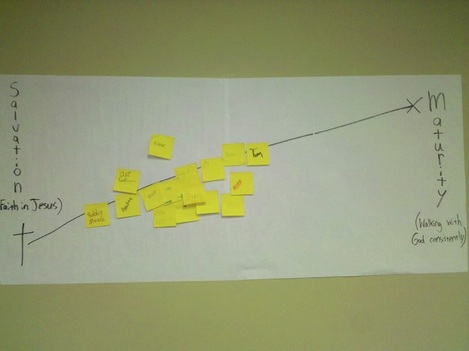Click right here to listen to/download the message from this week's IMPACT youth service. Great kick-off to our series!
2 Comments
This weekend I'm teaching students on the question "Can we know that God exists?" Tough topic, to be sure! In my preparation I sat down today and watched the pilot for the Discovery Channel's new show "Curiosity" featuring Stephen Hawking answering a similar question. Of course, Hawking's final thesis was that no, God does not exist. Though I think the guy is INSANELY brilliant, I could go on and on about why I think his logic on this is flawed (check out my Facebook statuses from earlier today!). But more importantly than that, I was reminded how important it is for us in YM to help our students navigate through some of the conflicting ideas that are out there regarding the existence of God and our ability to know Him. I know it can be intimidating for the average youth minister to teach or lead discussions on this topic. But take heart! There are lots of great resources out there for you. One of my new favorites that I led a group of middle school, high school, and college students through early this year is called True U: Does God Exist. This is a fantastic video-based study that our students absolutely loved! WARNING - some of the information can go a little over a middle schooler's (or a youth pastor's!) head, but I told my students to not worry about the information as much as the ideas. Go for the big picture stuff, so to speak. Check out the trailer below for True U and click right here to check out the website. This is really important stuff - ask your students what conflicting worldviews they face when it comes to the existence of God, and then help them strengthen their faith by talking about and teaching on those issues! We started a new series at IMPACT last night: FUEL. Here's a run-down of the series, including each message!
::LENGTH 3 Weeks ::DIRECTION The Christian life is filled with highs and lows, and sometimes it feels like your faith is running on empty. BUT there are certain things we can do to fuel the fire for Christ in us. During this series we’ll look at three ways to fan the flame and “gas up” for this journey called life. ::MESSAGES Part 1: Remembering (Worship) oMessage in a minute - When you feel like you’re running on empty, remember who God is, what He has done, and what He has promised to do. oText - Psalm 42 Part 2: Reading (The Word) GUEST SPEAKER oMessage in a minute - There is no fuel in this life quite like reading God’s Word – it is not just a source of information, but a catalyst for transformation. Fill up on the Word! oText - speaker’s choice. Part 3: Reaching (Evangelism) oMessage in a minute - Nothing will set you on fire and get you moving in your faith like reaching others for Christ. It is one of, if not THE most exciting experience you’ll ever have - seeing someone you love come to Jesus! oText - Acts 2 The news of Osama bin Laden's death and the subsequent discussion on how Christians should appropriately respond to it has DOMINATED the internet this week (at least the part I frequent), and I know that many youth workers are looking for ways to engage young people in discussion about how exactly we can respond in a godly way to the past week's events.
I'm using an inductive study and discussion format this week to discuss ObL's death, violence, justice, and God's heart with students. Instead of having a "sermon" or message where I give only my perspective on the issue, I think it's important to involve students in the discussion and come to some "conclusions" (using that word loosely!) together. Frankly, I'd be lying if I said I knew exactly how to feel about the whole thing. But I embrace the opportunity to discuss, discern, and discover what it means to follow Christ well in the midst of what I think we'd all agree is a profound moment in our generation. I'd love to share the study and discussion guide with you. Here's the student sheet - use this at the front end of your discussion to get students thinking biblically about violence, justice, death, sin, etc. Here's the discussion guide - use this to move your students through a discussion on the issues. Let me know how it goes! - Tim B. So I'm doing some digging through old files - specifically message and study notes - from the last 5 or 6 years, and I made a few interesting discoveries about my speaking/teaching.
#1 - How I use the Bible in messages has changed. When I was younger I used the Bible as support for my points. Most of my points were (luckily) Biblical, but I was starting with what I wanted to say and THEN bringing the Word in. More recently the Bible has been my starting point, and I draw my points from the text. The intelligent-sounding way to say this is I've become much more exegetical vs. isogetical in my preaching/speaking. #2 - I've been talking about the same things for years. It's kind of funny. I've been teaching on the same handful of topics for years, because I feel they are the most relevant to students. They are: - Who Jesus is, loving Him. - The Bible, growing in your faith. - Serving others. - The importance of Christian community. - Family. - Sex/dating/relationships. - Friendship. - Being different (in a good way - see Rom. 12:2). #3 - I'm at the point where I can stop writing messages. Seriously. I could just edit and reuse what I have now for the rest of my life. Obviously I'm not going to do this, because my favorite part of YM is communicating God's truth to students in new and relevant ways, but it's nice to know that if things get crazy one week I've got a nice vault of stuff to pull from. What about you? Have you looked back through your archives lately? What does your teaching/preaching history say about you? - Tim B. Wow! The last few weeks have been a blur. It seems like it's been one thing after another as our family has been through illness after illness (this week it's chicken pox with Grayson!) and at the same time ministry and church life chug ahead at full steam.
I did want to take a second and talk about a great opportunity I had last weekend. I spoke at a youth retreat called "Remade" at a Great Wolf Lodge north of Cincinnati for a group of about 35 middle and high school students. It was a super-short (less than 24 hours for me) but fantastic experience. I spoke at three sessions (Friday night, Saturday morning, and Saturday afternoon) on the idea/topic of God's desire to remake our hearts and our lives. The sessions looked like this: #1 - We are broken. Romans 3:9-18. Focus on our need to be remade. #2 - We can't fix ourselves. Mark 10:17-22. Focus on the foolishness of the question "what can I do" to be remade and our inability to fix ourselves. #3 - Jesus can and wants to remake us. 2 Corinthians 5:16-17. Focus on the only true way to be remade - in Christ. Special emphasis on not just God's ability to remake us but His desire to do so. Only a great love for us can explain that. Worship was great - led by Isaac Pitman from Apex in Dayton, Ohio - and I think one of the big strengths of the weekend was how well the theme came together, from music to media to message. It was a lot of fun, and I look forward to adapting the sessions in to a series here at FBCCS soon. I'll share with you what comes out of that on here! - Tim B. I thought I would do a series of posts this week called "Easy Videos". I LOVE using videos in our youth gatherings, and it really doesn't take much to pull it off. In my low/no-budget situation, we've used an almost-20-year-old big screen TV and a modest laptop running Powerpoint for years. Couple that with the great amount of free or cheap content out there (www.bluefishtv.com), and you can really add a new dimension to your time with students that can enhance your teaching/speaking/theme.
This week I want to focus on what you can do with an entry-level laptop, Windows Movie Maker, and a handheld digital video camera (I have a Flip HD I got for Christmas a few years ago). The first video, above, is one I made to go along with a teaching series called "What's Your Story" that guided students through the process of developing both the desire and the skill to share their faith with others. Rather than stand up front and give a 5-10 minute testimony, I mounted the Flip on a tripod on its tallest setting and pointed it over my shoulder as I sat at my desk. I then took a blank legal pad and a sharpie and just started writing out my story, one little bit at a time on each page. I uploaded the footage into Media Player (Flips are super easy to upload), sped the footage up, and dropped some music in from www.freeplaymusic.com (royalty free music you can download for... you guessed it - FREE!). This would be super-easy for you to duplicate and would be a great alternative for you or a guest speaker to quickly share your story as an introduction or illustration. Let me know if you try it out! - Tim B. If you're doing a message/study on spiritual growth any time soon, you can use a short quiz I came up with to get your students talking. Click right here to download the "Ready.Set.Grow!" quiz. (Tip: right-click on the link, then select "save target/link as".)
With quizzes like this, you have to be careful to remind students that it's just a piece of paper, not an official diagnosis of their spiritual health, and the whole point is simply to get them thinking about their spiritual growth. I used this quiz and then just asked one simple question after it, before leading in to the rest of the message - "In the last year, do you feel like you've grown a lot, a little, or not at all?" Also, a great and more open-ended idea to get your students talking about spiritual growth is to create a "graph" like the one above I drew on butcher paper. Label one end as "salvation" or "the beginning of my walk", and label the other end as "spiritual maturity" (using those words alone can lead to a good discussion about what spiritual maturity even is). Give each student a post-it note, let them write their name on it, and then have them all - at the same time - come up and put themselves where they feel like they are on the "growth" spectrum. Be sure to remind them that this is not a time to make comments or laugh because of where someone puts their name on the graph. ALSO, make sure you don't make the same mistake I did - putting yourself up there first, as most if not all your students will assume they need to be behind you on the growth spectrum. Oops! Then ask one question and let them discuss: "Why did you put yourself where you put yourself?" I was amazed at the honesty and insight our young people offered up during this exercise. It was awesome! If you use either of these ideas, let me know how it goes! - Tim Our Christmas teaching series in YM this year is called "Grinches". We're looking at four different things that "steal" the true meaning of Christmas way from us. Yesterday we tackled Grinch #1 - materialism.
Here's a quick outline of where we went during the study: - Series intro. - What is materialism? - How can we tell if we are materialistic? - What does the Bible say about materialism? - Read Matthew 6:19-21. - What is the problem with setting your heart on "stuff"? (It is temporary.) - What are treasures in Heaven? - Why should we focus our hearts on Heavenly treasures instead of earthly ones? (HT's are permanent.) - Where are our hearts focused this Christmas? - Small group discussion. Great kick-off to the series - excited about this one! Next up is selfishness. - Tim B. |







 RSS Feed
RSS Feed
